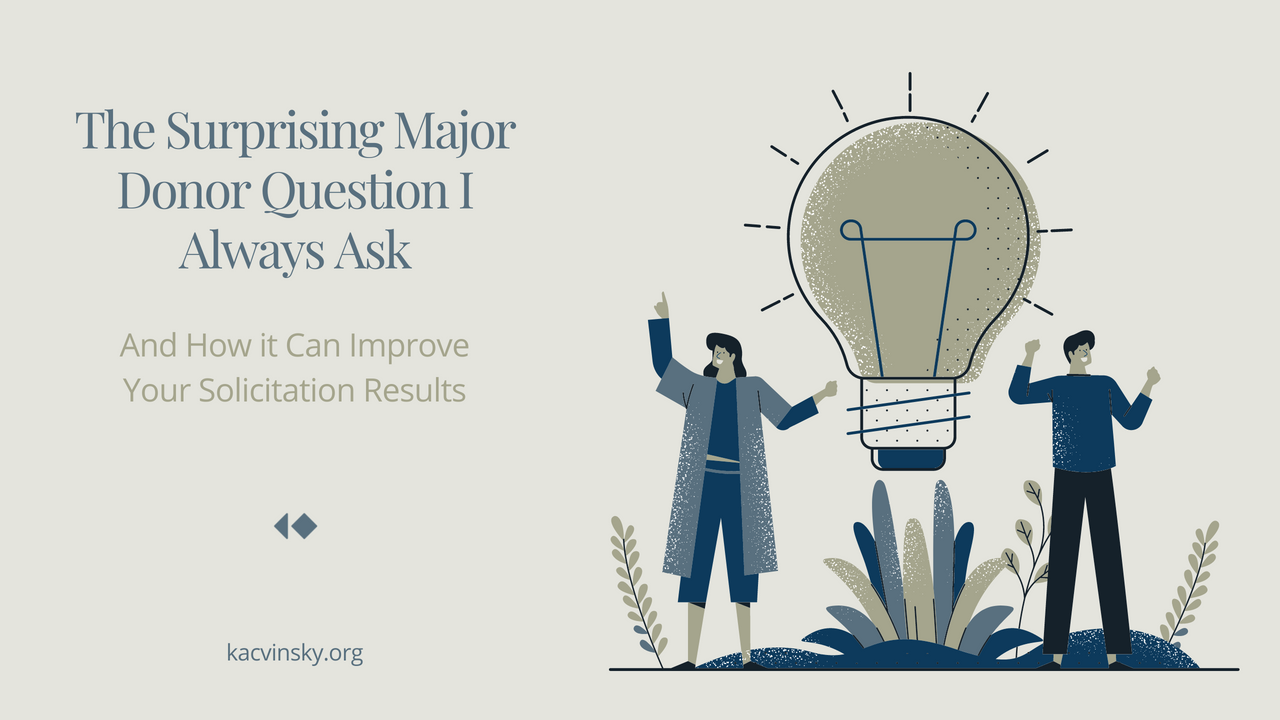The Surprising Major Donor Question I Always Ask
Feb 14, 2022
The Surprising Major Donor Question I Always Ask
Since 2010 or so, every time I am part of a major donor appeal, I ask the millionaire (or billionaire) one question…. and it’s not what you think.
I ask every donor I have ever solicited a $25,000+ gift,
“At what point did you become wealthy.”
The results will surprise you. With few exceptions (maybe 2 or 3 in 11+ years), major donors did not get their wealth from an inheritance or luck (like buying the right stock at the right time or discovering something to patent). Nearly all major donors accumulated their wealth slowly, over time. I have heard many stories, but one particular event stands out above all others: I would say over 80% of these donors say that they began accumulating wealth most rapidly after paying off their house mortgage. Some pay it off over time, others with additional incremental payments, in one fell swoop when they sell a business, etc.—either way, not having a mortgage payment is a rite of passage where these donors begin a journey of having a significantly more flexible cash flow and having less stress and anxiety about making money. Without payments, they are keeping their money, making their shovel larger, and enabling them to dig out of debt and accumulate wealth with significant force. Around the time of paying off their mortgage, many people begin to become outrageously generous.
For a while, I truly believed this was part of what our society sees as an ebb and flow of people’s wealth based upon their age. Here’s how we tend to teach our young people: You start out at an entry-level job with student loans, by the time you begin making a decent living, you get married and have kids, then your kids grow up and are expensive. By the time people are in their mid-40s or early 50s, they usually have some disposable income because they are secure in their careers and have made it through the difficult period. But now, they need to save for retirement. Have you heard this theory? I call it “the lament that we will always be poor.” However, my experience was very different. Not all major donors became wealthy late in life, not all donors fully funded their retirement before making large gifts, many still have 6+ children living at home. What really came as a shock to me was how many young people – under 40 or in their early 40s – were making gifts of $40,000, $100,000, and more.
Why do I share this finding? Because asking for a gift is asking people to part with their hard-earned money. When we see someone with extraordinary wealth, it is easy to believe that they should easily part with it. In fact, if you watch TV, we plan that they “should” part with it. The media, the lower and middle-class, and that one broke relative who just knows everything there is to know about the stock market can all tend to look at those with abundant wealth and treat them as if they should want to just spend it on this or that altruistic theory; and after all, why wouldn’t they want to support your cause too? But be wary of that attitude. The facts speak otherwise.
If nearly all major donors accumulated their wealth slowly, over time, then they are less likely to so easily part with it. They remember the days of scarcity; they remember scrimping and saving; they remember what it was like to worry about money. Almost all the donors of significant means I have ever spoken with know and deeply understand just how difficult it is to become wealthy. Therefore, here is the golden nugget… when you approach major donors, approach them from their mindset. Understand that they worked extremely hard for their money, do not assume they should use their hard-earned wealth to support your cause, instead show them how they can make a difference with it. Partner with them and revere the fact that they worked so hard to get where they are. You will do much better in your major donor appointments when you approach donors from this light.
Still don’t believe this theory? That’s okay. Become friends with some more wealthy people and get close to them. You will have a better understanding of how to talk to wealthy people. At the end of the day, seeking a gift has to do with personal finance – it’s personal. Don’t treat someone’s wealth as something public and for a group decision – treat it as their private matter and be sensitive. It will pay off.

